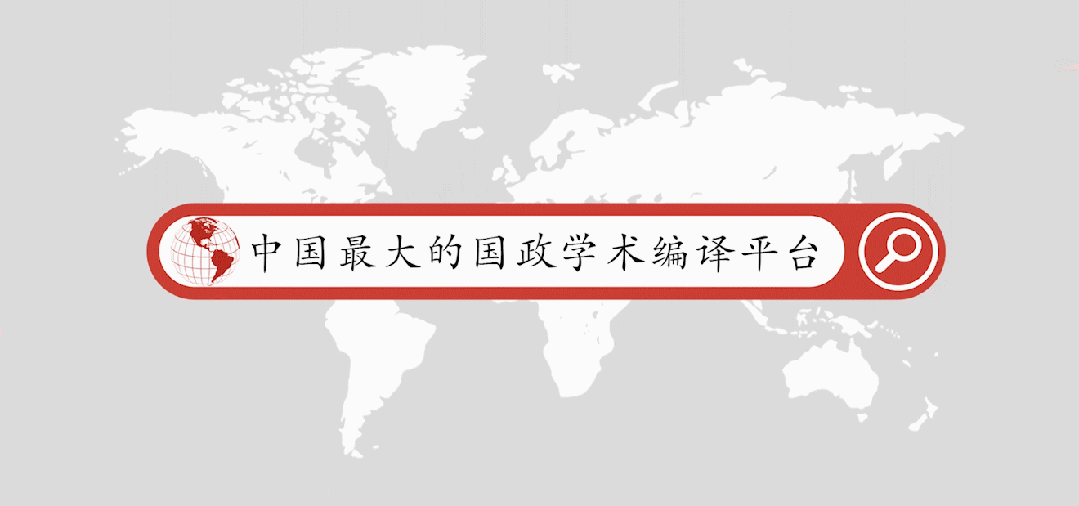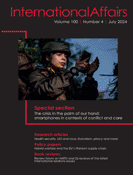
期刊简介

《国际事务》(International Affairs)是国际关系领域的一流学术期刊,也是多学科综合性学术期刊。本刊于1992年由伦敦皇家国际事务研究所查塔姆学院(Chatham House)创立,内容来源广泛,力图囊括业内专家、学术新秀对重点、热点问题的最新思考。2022年期刊影响因子为4.5,在96个国际关系类刊物中位列第7名。
本期目录
1
抗击下一场疫情?新冠肺炎疫情后卫生紧急状况下的民事和军事合作
Fighting the next pandemic? Civil–military collaboration in health emergencies after COVID–19
2
乌克兰与军事援助的机会成本
Ukraine and the opportunity costs of military aid
3
西方在战略方面为何如此糟糕
Why is the West so rotten at strategy?
4
什么是种族?认知模糊与自由国际秩序
What is race? Epistemic ambiguity and liberal international order
5
技术标准的地缘政治:美国、欧盟和中国做法的历史背景
The geopolitics of technology standards: historical context for US, EU and Chinese approaches
6
外交政治化:大使任命的比较研究
The politicization of diplomacy: a comparative study of ambassador appointments
7
战争阴影下的军事化与流行文化:2022年欧洲歌唱大赛
Militarization and popular culture in the shadow of war: the 2022 Eurovision Song Contest
8
尼日尔三角洲的海盗和更广泛的“枪支生意”
Piracy and the broader ‘gun business’ in the Niger Delta
9
俄罗斯因素:情感、叙事和重塑中国在国际冲突中的规范
The Russian factor: emotions, narratives and reshaping China's norms in international conflicts
内容摘要
抗击下一场疫情?新冠肺炎疫情后卫生紧急状况下的民事和军事合作
题目:Fighting the next pandemic? Civil–military collaboration in health emergencies after COVID–19
作者:Colin McInnes,亚伯大学国际政治系教授。
摘要:在过去十年中,军队一直是应对卫生突发事件,特别是疾病爆发的重要力量。尽管军民合作在卫生领域有着悠久的传统,但在 COVID-19 事件中,军方在全球卫生、人道主义干预和多部门性等叙事所建立的宽松环境下,在世界范围内的应用是前所未有的。这就造成了一个两难的局面:军队很可能成为应对重大突发卫生事件的一个要素,而这不仅有可能使突发卫生事件军事化,而且会更普遍地影响社会与军队之间的平衡。此外,对 COVID 大流行的应对表明,目前的应急计划往往没有为在卫生危机中使用军队做好充分准备,从而降低了反应的有效性。本文探讨了对卫生安全化的担忧如何演变为对军事化的担忧,以及如何在未来的卫生突发事件中有效使用军队,而不冒卫生事件军事化的风险或更广泛地破坏军民关系的问题。尽管卫生领域有着悠久的军民合作传统,但 COVID-19 在全球卫生、人道主义干预和多部门合作的叙事所建立的宽松环境中,出现了前所未有的全球军队使用。这造成了一个困境:军队很可能是应对重大卫生紧急情况的重要因素,这不仅有导致卫生紧急情况军事化的风险,而且更广泛地影响社会与军队之间的平衡。此外,对 COVID 大流行的应对表明,当前的应急计划往往没有为在卫生危机中使用军队做好准备,从而降低了应对的有效性。本文探讨了对健康安全化的担忧如何演变为对军事化的担忧,以及如何在未来的卫生紧急情况下有效地使用军队,而不会冒着健康军事化的风险或更广泛地损害军民关系。
Over the past decade, militaries have been highly visible elements in the response to health emergencies and in particular disease outbreaks. Although there has been a long tradition of civil–military collaboration in health, COVID–19 saw an unprecedented worldwide use of militaries which occurred within a permissive environment established by narratives of global health, humanitarian intervention and multi-sectorality. This creates a dilemma: militaries will likely be an important element in responding to a major health emergency and this risks not only militarizing health emergencies, but affects the balance between society and the military more generally. Moreover, the response to the COVID pandemic suggested that current emergency planning is often poorly prepared for the use of militaries in health crises, thereby reducing the effectiveness of a response. This article engages with how concerns over the securitization of health have evolved into concerns over militarization, and the question of how militaries might be used effectively in future health emergencies without risking the militarization of health or damaging civil–military relations more widely.Over the past decade, militaries have been highly visible elements in the response to health emergencies and in particular disease outbreaks. Although there has been a long tradition of civil–military collaboration in health, COVID–19 saw an unprecedented worldwide use of militaries which occurred within a permissive environment established by narratives of global health, humanitarian intervention and multi-sectorality. This creates a dilemma: militaries will likely be an important element in responding to a major health emergency and this risks not only militarizing health emergencies, but affects the balance between society and the military more generally. Moreover, the response to the COVID pandemic suggested that current emergency planning is often poorly prepared for the use of militaries in health crises, thereby reducing the effectiveness of a response. This article engages with how concerns over the securitization of health have evolved into concerns over militarization, and the question of how militaries might be used effectively in future health emergencies without risking the militarization of health or damaging civil–military relations more widely.
乌克兰与军事援助的机会成本
题目:Ukraine and the opportunity costs of military aid
作者:Luke Glanville,澳大利亚国立大学国际关系系教授;James Pattison,曼彻斯特大学政治系教授。
摘要:西方国家向乌克兰提供了数十亿美元的军事援助,以帮助其对抗俄罗斯。然而,尽管对战争引发的道德问题进行了多次讨论,但对这种军事援助的机会成本的讨论却很少。从被迫流离失所到全球贫困,从可预防的疾病到气候变化,乌克兰冲突只是世界面临的众多挑战之一,那么西方优先考虑对乌克兰的军事援助是否正确?本文首次详细探讨了这个问题,认真考虑了各国面临的非理想可行性约束。它首先阐述了由于机会成本而反对对乌克兰进行军事援助的表面理由。然后,它探讨了,并在很大程度上拒绝了两种回应:军事援助是保护乌克兰自决权所必需的,也是阻止独裁主义前进所必需的。它认为,关于机会成本的反对意见具有很强的说服力,并且反对向乌克兰提供大部分军事援助(尽管不是全部)。这一论点对各国应在多大程度上优先考虑军事援助而不是其他应对全球挑战的手段具有更广泛的影响。
Western states have provided billions of dollars of military aid to Ukraine to help it in its war against Russia. Yet, despite numerous discussions of the ethical issues raised by the war, there has been little discussion of the opportunity costs of this military assistance. Is it right that the West has prioritized military assistance to Ukraine, when the conflict in Ukraine is just one of numerous challenges facing the world, from forced displacement to global poverty, preventable disease to climate change? This article offers the first detailed engagement with this issue, taking seriously the nonideal feasibility constraints that states face. It firsts set out the prima facie case against assisting Ukraine militarily due to the opportunity costs. It then explores—and largely rejects—two responses: that military assistance is required to protect Ukrainian self-determination and that it is needed to stop the march of authoritarianism. It argues that the opportunity costs objection has serious force and counts against much of the provision of military assistance to Ukraine (although not all). This argument has broader implications for the extent to which states should prioritize military aid over other means of addressing global challenges.
西方在战略方面为何如此糟糕
题目:Why is the West so rotten at strategy?
作者:M L R Smith,伦敦国王学院战争研究系教授。
摘要:为什么西方外交政策从阿富汗到乌克兰都呈现出持续的战略失败记录?为什么尽管人们致力于寻找良好战略的基础,但结果仍然如此糟糕?本研究旨在以严谨的学术态度来研究这些问题。它指出,无法以适当的方式处理问题是导致战略结果不佳和政策制定中反战略偏好增长的主要因素。这种不均衡性主要源于自由派精英对道德使命的承诺,而这种承诺破坏了退出方案和有限制的目标。这引发了一种不断升级的动态,并不可避免地导致失败。此外,很少有人对预测上的无能或鲁莽的倡导负责,这只会加剧战略表现不佳的倾向。该论点认为,这些因素都可以在持久的全面战争范式中得到体现,这种范式对西方政策制定产生了过度决定性的影响,推动战略制定朝着抽象目标和无限制地使用资源的方向发展。尽管西方战略制定中这些根深蒂固的问题没有简单的解决办法,但本文认为,尝试将战略理念从“解决问题”转变为“构建问题”,可以为更深思熟虑的政策反思提供前景,并促进从错误中学习而不是重蹈覆辙。
Why has western foreign policy exhibited a record of sustained strategic failure, from Afghanistan to Ukraine? Why is it that despite the intellectual attention devoted to identifying the foundations of good strategy, outcomes remain so poor? This study seeks to bring a process of academic rigour to these questions. It pinpoints an inability to relate to problems proportionately as the major factor that accounts for bad strategic results and the growth of an anti-strategic predilection in policy-making. This lack of proportionality arises largely from a liberal-elite commitment to moral missions that undermine exit plans and bounded objectives. This sets in train an escalatory dynamic that inexorably spirals towards failure. Furthermore, rarely is there any accountability for predictive ineptitude or reckless advocacy, which merely entrenches the propensity towards poor strategic performance. The argument contends that these factors can all be captured within an enduring paradigm of total war, which exerts an overdetermining influence on western policy-making, pushing the formulation of strategy towards abstract goals and the unrestrained application of resources. While there are no easy answers to overcome these deep-seated problems in western strategic formulation, this article suggests that an attempt to move the idea of strategy away from ‘problem-solving’ to ‘problem-framing’ can offer the prospect of more considered policy reflection and facilitate a process of learning from mistakes rather than repeating them.
什么是种族?认知模糊与自由国际秩序
题目:What is race? Epistemic ambiguity and liberal international order
作者:Kavi Joseph Abraham,杜伦大学国际关系系助理教授。
摘要:人们越来越关注反殖民主义行为者如何在本世纪中叶的自由国际秩序 (LIO) 形成过程中推进种族平等规范。然而,人们较少关注同时发生的关于“种族”科学对象的认识论冲突及其政治影响。在战后秩序建设期间以及种族平等的政治斗争中,科学界对种族作为人类多样性分类手段的分析效用进行了广泛而深入的辩论。我认为,种族在认识论上是模棱两可的,夹在社会科学家和哲学家(他们将种族理解为类似于种族的社会结构)与自然科学家(他们认为种族是生物学基础)之间。这种分裂不仅限于学术辩论,还塑造了关于 LIO 种族平等制度化的政治和规范斗争。采用以对象为的方法,本文认为种族的认识论模糊性产生了政治影响,既允许在 LIO 中重现殖民逻辑,也为抵抗策略提供了空间。笔者未采用线性因果关系,而是从经验层面上来描绘认知模糊性在本世纪中叶国际秩序的建立中所发挥的作用。
There is increasing interest in how anticolonial actors advanced a norm of racial equality in mid-century formations of liberal international order (LIO). Less attention, however, is afforded to simultaneous epistemic conflicts over the scientific object of ‘race’ and their political effects. During postwar order-building and alongside political struggles for racial equality, there was wide and deep scientific debate on the analytical utility of race as a means to categorize human diversity. Race, I demonstrate, was rendered as epistemically ambiguous, caught between social scientists and philosophers who understood it as a social construct akin to ethnicity and natural scientists who maintained a biological basis. This split was not confined to academic debate but shaped political and normative struggles over the institutionalization of racial equality in LIO. Adopting an object-oriented approach, I argue that the epistemic ambiguity of race generated political effects, at once permitting the reproduction of colonial logics in LIO as well as providing latitude for strategies of resistance. Rather than a linear causal effect, I empirically map the work that epistemic ambiguity performed in the creation of mid-century international order.
技术标准的地缘政治:美国、欧盟和中国做法的历史背景
题目:The geopolitics of technology standards: historical context for US, EU and Chinese approaches
作者:Nicholas Zúñiga
摘要:本文回顾了影响新兴技术标准制定的全球竞争的历史趋势。具体来说,本文探讨了传统的国际标准化规则制定者,即美国和欧洲,如何应对中国在标准制定领域的崛起。本文认为,三个国家和地区正在调整其标准制定战略,以适应国际技术秩序中不断变化的权力动态。为了保持竞争优势,美国在制定技术标准方面愈发干预和积极主动。中国制定了一项长期标准化战略,以促进国内工业发展,提高影响力,并从规则制定过程中获取更多利润。最后,欧盟正在寻求第三种方式,在竞争与合作之间取得平衡,以维护相互可操作性等价值观,这些价值观在历史上一直使其单一市场和全球经济受益。本文的历史回顾表明,虽然这三个国家和地区有不同的优先事项和面临的不同挑战,但它们似乎都趋向于让政府在标准制定中发挥更大的作用。
This article provides a review of the historical trends that are shaping global competition for standard setting in emerging technologies. Specifically, it explores how the traditional rule-makers of international standardization, namely the United States and Europe, are responding to the rise of China in standard-setting. The article argues that three polities are adapting their standard-setting strategies to shifting power dynamics in the international technology order. To preserve its competitive advantage, the US is becoming more interventionist and proactive in setting technology standards. China has developed a long-term standardization strategy to bolster its domestic industrial development, increase its influence and reap greater profits from the process of rule-making. Finally, the EU is seeking a third way that strikes a balance between competition and cooperation to preserve values like interoperability, which have historically benefited its single market and the global economy at large. Our historical review shows that, while the three polities have different priorities and face distinct challenges, they all seem to converge towards a greater role for governments in standard-setting.
外交政治化:大使任命的比较研
题目:The politicization of diplomacy: a comparative study of ambassador appointments
作者:Birgitta Niklasson,哥德堡大学政治学系讲师;Katarzyna Jezierska,哥德堡大学政治学系副教授。
摘要:外交政治化削弱了外交部门的专业性,可以说危及了国家的对外关系。然而,这种现象在很大程度上并未被学术界审视。公共行政对政治化的研究通常忽视了外交部门,而外交学者几乎只关注美国。我们对大使任命的探索性研究比较了 2019 年 669 名大使的政治化水平和模式(通过有政治关系的专业人士或政治任命者),这些大使来自七个国家和三个行政传统。分析以三个预期为指导:1)总体上政治化程度更高的国家会任命更多非职业大使;2)政治任命者的赞助招募侧重于低艰苦的职位;3)有政治关系的专业人士被用来控制具有政治重要性的外国使团。本文发现,各国以不同的程度和方式将其外交部门政治化。在本文的案例中,任命有政治关系的专业人士而不是政治任命者是最常见的政治化方式。在这方面,美国是一个例外,这也表明需要对外交政治化进行比较研究。因此,本文通过为这一迄今尚未深入探讨的话题的未来研究设定议程做出了重要贡献。
A politicization of diplomacy weakens the professionalism of the foreign service and arguably endangers the external relations of states. Yet, this phenomenon has largely escaped scholarly scrutiny. Public administration research on politicization usually overlooks the foreign service, whereas diplomacy scholars have focused almost exclusively on the United States. Our exploratory study of ambassador appointments compares the levels and modes of politicization (through politically connected professionals, or political appointees) of 669 ambassadors in 2019, across seven countries and three administrative traditions. The analysis is guided by three expectations: 1) countries that are more politicized overall appoint more non-career ambassadors; 2) patronage recruitment of political appointees focuses on low-hardship postings; and 3) politically connected professionals are used to control politically important foreign missions. We find that states politicize their foreign services to a varied degree and in different ways. Appointing politically connected professionals instead of political appointees is the most common way of politicization among our cases. In this regard, the US is an outlier, which also points to the need of studying politicization of diplomacy comparatively. This article thus makes an important contribution by setting the agenda for future research on this hitherto underexplored topic.
战争阴影下的军事化与流行文化:2022年欧洲歌唱大赛
题目:Militarization and popular culture in the shadow of war: the 2022 Eurovision Song Contest
作者:Inbar Noy,希伯来大学国际关系系博士研究生
摘要:在持续的战争背景下,文化大型活动的政治作用是什么?本文探讨了战争阴影下文化大型活动与军事化进程之间的相互作用。它解决了两个主要问题:战争期间对此类活动的政治性缺乏关注,以及流行文化学者通常对军事化的具体理解。它研究了军事化的物质和象征形式的发展,并探讨了大型活动背后的商业逻辑对军事化实践强化和正常化的影响。从实证角度来看,本文重点关注了在 2022 年欧洲歌唱大赛中以及通过该大赛发展起来的不同军事化进程,以应对俄罗斯入侵乌克兰。它研究了这些进程在乌克兰(通过 Kalush 管弦乐队的军事化和乌克兰歌曲“Stefania”的军事化)、欧洲歌唱大赛本身以及整个欧洲(通过参加比赛)是如何发挥作用的。这样做也有助于更广泛地讨论欧洲安全身份的变化以及新的军事化自由欧洲身份的发展。本文还利用社交媒体数据,强调了此类平台在军事化进程中的作用。
What is the political role of cultural mega-events in the context of ongoing war? The article examines the interaction between cultural mega-events and militarization processes in the shadow of war. It addresses two main gaps: the lack of attention to the politics of such events during war, and the specific understanding of militarization usually adopted by popular culture scholars. It examines the development of material and symbolic forms of militarization, and addresses the impact of the commercial logic behind mega-events on the intensification and normalization of militarized practices. Empirically, the article focuses on the different militarization processes that developed in and through the 2022 Eurovision Song Contest, in response to the Russian invasion of Ukraine. It examines how these play out in Ukraine (through the militarization of the band Kalush Orchestra and the militarization of the Ukrainian song ‘Stefania’), within the Eurovision contest itself and across Europe (through its participation in the competition). In doing so it also contributes to the broader debate about the changing security identity of Europe, and the development of a new militarized liberal European identity. Using data from social media, the article also highlights the role of such platforms in militarization processes.
尼日尔三角洲的海盗和更广泛的“枪支生意”
题目:Piracy and the broader ‘gun business’ in the Niger Delta
作者:Katja Lindskov Jacobsen,哥本哈根大学政治系副教授;Amanda Møller Rasmussen,奥胡斯大学政治学博士研究生。
摘要:海盗行为不能脱离其他(犯罪)行为单独理解,但我们如何探索这种联系,以及为什么了解它们对海盗和反海盗的影响很重要?尼日尔三角洲的海盗活动已降至历史最低水平,本文探讨了海盗在不靠海盗活动维持生计时会做什么。因此,本文对海盗行为中未被充分探索的方面提供了新颖的经验见解。此外,本文使用这个案例研究来证明基础性启发的概念化的重要性远远超出了海盗和反海盗的分析。展示海盗行为如何与干预措施未解决的更广泛且往往暴力的基础设施相关联,并强调这种联系的连续性和变化的关键影响,是理解干预参与者面临的更广泛困境的核心的第一步:如何概念化界定问题的必要性,同时理解未解决的问题维度的重要性?本文的建议是,基础性启发的方法提供了一个有益的起点,本文在分析尼日尔三角洲海盗如何成为更广泛的“枪支生意”格局的一部分时证明了这一建议,这不仅涉及不同类型的犯罪,还涉及不同类型的受害者。
Piracy cannot be understood in isolation from other (criminal) engagements, but how can we explore such linkages and why is it relevant to understand their implications, both for piracy and counterpiracy? Appreciating that Niger Delta-based piracy has dropped to historically low levels, this article explores what pirates do when they do not sustain themselves by engaging in piracy. As such, the article offers novel empirical insights into underexplored dimensions of piracy. Moreover, we use this case-study to demonstrate the relevance of an infrastructure-inspired conceptualization much beyond analyses of piracy and counterpiracy. Showing how piracy is linked to broader and often violent infrastructures that interventions leave unaddressed, and stressing key implications of the continuity and change in such linkages, is a first step towards appreciating the centrality of a broader dilemma that intervention actors confront: how to conceptualize the necessity to delimit a problem, while appreciating the significance of problem-dimensions left unaddressed? Our suggestion is that an infrastructure-inspired approach offers a helpful starting-point, a suggestion that we demonstrate in an analysis of how Niger Delta-based piracy forms part of a broader ‘gun business’ landscape, which does not only entail different types of crime but also various types of victims.
俄罗斯因素:情感、叙事和重塑中国在国际冲突中的规范
题目:The Russian factor: emotions, narratives and reshaping China's norms in international conflicts
作者:Xiaoyu Lu(吕晓宇),北京大学国际关系学院助理教授;Tinghao Zhang
摘要:尽管俄罗斯处于弱势地位,但它如何对中国在叙利亚和乌克兰等国际冲突中的规范方法产生持续而持久的影响?本文提出了一个理论框架,将国际关系中的情感转向和规范研究联系起来。它将情感概念化为规范脚本的情感基础设施:共同的政治感受产生共鸣,在此基础上,有说服力的叙述有助于维持团结并使规范变革制度化。本文利用俄罗斯和中国的主要资源,并使用过程追踪来确定伙伴关系和俄罗斯运动的制度渠道中的关键节点,展示了中国与俄罗斯的结盟并非完全基于地缘政治利益或建构身份,而是一种孤立和边缘化的情感,这种情感首先引起了俄罗斯参与者的共鸣,然后被俄罗斯参与者利用。此外,本文还确定了三种类型的有说服力的叙述,用于构建连续性、类比和认同,以巩固围绕同单一西方威胁的情感共鸣并诱导规范趋同。这促使中国采取与国家利益和主权与领土完整规范相冲突的政策,引发对俄罗斯影响力的反思,同时凸显了情感外交日益增长的重要性。
How did Russia, despite being in a weaker position, exercise a continuous and resilient influence on China's normative approach to international conflicts from Syria to Ukraine? This article proposes a theoretical framework that connects the affective turn and norm studies in International Relations. It conceptualizes emotions as the affective infrastructure of norm scripts: shared political feelings create resonance, based on which persuasive narratives work to maintain solidarity and institutionalize normative changes. Drawing on primary Russian and Chinese resources and using process tracing to identify critical junctures in the partnership and institutional channels for Russian campaigns, this article demonstrates how China's alignment with Russia is not solely based on geopolitical interests or constructed identities but rather a result of feelings of isolation and marginalization that firstly resonated with and then exploited by Russian actors. Furthermore, this article identifies three types of persuasive narratives used to construct continuity, analogy and identification in consolidating emotional resonance around the threat of a homogenous West and inducing normative convergence. This drives China to adopt policies in conflict with national interests and norms on sovereignty and territorial integrity that trigger a reflective assessment of the Russian influence, while underlining the growing importance of emotion diplomacy.
编译 | 王涵婧
审核 | 赖永祯
排版 | 韩欣洁
本文源于《国际事务》,本文为公益分享,服务于科研教学,不代表本平台观点。如有疏漏,欢迎指正。

